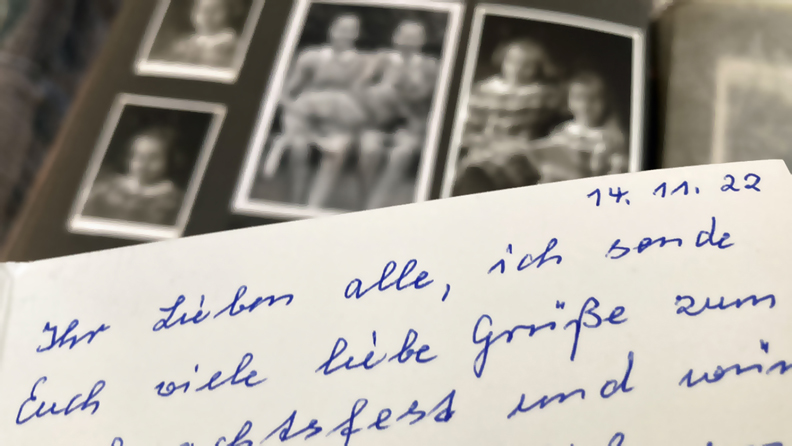
(Thomas Froese)
(The Hamilton Spectator – Saturday, February. 11, 2023)
BERLIN – There are 60 stairs to Tante Eva’s third-floor apartment on Friedrichsruher. I reach them after walking from my hotel for five kilometres, walking to see this city of my birth, flowers in hand.
Earlier, Eva, 91 and living on her own, navigated these stairs, boarded, by herself, a bus, travelled to a favourite bakery for “Kuchen,” that’s cake, then returned, arms filled, back up the stairs. Then the sweets are laid out with coffee, lovingly poured in her modest apartment of five decades.
Eva’s husband died when she was young, but she’s enjoyed a life of singleness, nursing, and travel. Her only sibling, my mother, Hannelore, died in Berlin 52 years ago, her two children, by then, in Canada. For five decades, like clockwork, Eva has since sent packages to Canada with affection and chocolates, “German vitamins,” as they’re called, even to my children.
“Ihr Lieben alle, ich sende Euch viel Liebe,” she wrote recently in her striking script. (“Dear all. I send you lots of love.”)
Travelling Uganda to Canada, now I’m receiving this affection in person, receiving German lessons, of sorts, in this hip and reflective city that’s green with neighbourhood playgrounds and parks. The lessons aren’t exactly what Frau Pfeifer taught in German class in my Niagara high school. They’re heart language.
Even so, “Mein Deutsch ist nicht perfekt.” (My German isn’t perfect.) So extended family, Siegfried and Andrea, join Eva’s party to translate. We talk for hours, share photos, then meet another day to complete the puzzle more, the picture of my, and my sister’s, early years in Germany. Like old letters and 8mm film shared by Eva – look, there’s my mother helping me to walk – it’s all like gold.
In Eva’s childhood it was always her and Hannelore, two sisters running together through life, even through war. In the spring of 1945 – Eva was 14 and Hannelore, 16 – about 200,000 people perished in the Battle of Berlin, including tens of thousands of civilians. In 12 days. Imagine. Whenever war bombs fell and the girls were moved to safety, it was “immer die Fotoalben” (always the photo albums) that their mother protected.
Because the story of ones being is all that any of us have, really. Eva’s story. Mine. Yours. The neighbours. Stories of being, filled with power and grace. Consider some of Canada’s immigrants now, poignant stories etched into faces, not unlike how each stroke and curve in Eva’s handwriting reflects something of herself.
By the way, while Canadian schools carelessly abandon cursive writing, eager seven-year-olds in Germany’s public schools, after mastering it, are rewarded with their own fountain pen. Highly-innovative Germans value cursive. Why? It builds memory and language in ways printing can’t.
My mother, when 16, used cursive for her 1945 biographical novella, “Zwei Mädels erleben den Weltkrieg.” (Two Girls Experience the World War.) Like Eva, she became a nurse. But my mother always wanted to be a journalist. I think about it, not the first time, back in my hotel, in Room 411.
Outside my window, in gray winter sky, is the jagged top of the historic Kaiser Wilhelm Memorial Church, left blown off to show Germany’s history. Thirty years ago, while a young reporter during my first return to Berlin, I worked with street people in the church’s surrounding public square, Breitscheidplatz.
Some urinated on the old church. One young man, running from Dutch authorities, wore a tank-top showing Christ crucified upside down, saying, “Jesus didn’t die for my sins. He died for his own.” That’s all another story. But as I look out the window, sitting beside me is my mother’s wartime manuscript, typed by Eva, now graciously gifted to me.
What’s left to say? It’s good to drink the water from where you come. Aber die Dinge, die wir, jeder von us, weitergegeben. (But the things that we, any of us, hand down.) Gott sei Dank geben wir auch Gutes weiter. (Thank God we hand down good things, too.)

Dear Thomas. Thank you from the bottom of my heart for your “Language Lessons” article and the “my mother” link. Both brought back many memories including: my father teaching me to read and write the German gothic script by coal oil lamp light during the long winter evenings in Saskatchewan, my Hungarian friend, who had escaped Communism at the end of WW11, with his love for family photographs, and my niece, Maria, once removed, who sends us a package of “Suessigkeiten”, sweets, from Germany every Christmas, all memories of loving people in an imperfect world. Blessings, Peter D
Loving people in an imperfect world. Gut gesagt. Danke, Peter.
Beautiful piece Thom…
Thanks, Steve.
Danke Thomas. Gotta Schutze dich. (Hope I got it right or almost right)
Likewise, Emmanuel. Und, ja, du hast es richtig gemacht. (And, yes, you got it right.)